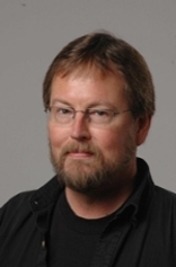
Ray Reed Larson
Professor of Information, Emeritus
In a long career on the University of California, Berkeley, campus, Ray Larson combined interests in libraries, literature, and computing to become an authority on digital libraries and the application of information retrieval techniques.
Born on November 6, 1951, in Fullerton, California, Larson, received a B.A. in English and comparative literature in 1974 and a M.S. in library science at California State University, Fullerton. His first experience in this field was at the Fullerton Public Library. He was an early adopter of small computers with a broad outlook; he built a database on medieval manuscript illuminations, for example. He came to Berkeley as a graduate student in the School of Information (then the School of Library and Information Studies).
During his graduate studies at Berkeley he worked at the UC Office of the President’s Division of Library Automation on the development of MELVYL, a pioneering online catalog of all the holdings of the libraries of the nine campuses. He drew on this experience for his doctoral dissertation, “Workload Characteristics and Computer System Utilization in Online Library Catalogs,” completed in 1986, which examined the optimal balancing of workload on the computer and effort by the human searcher.
He received a faculty appointment in the School of Library and Information Studies, which became the School of Information Management and Systems and now the School of Information, from 1984 until his retirement in 2016.
His early research as a faculty member included extensive analyses of the way that online library catalogs were used and how users’ search behavior changed as new features were added. For most of his academic life he developed his ideas and exploration of new techniques by building and continuously revising a complex information storage and retrieval system which he named Cheshire (California Hybrid Extended SMART for Hypertext and Information Retrieval Experimentation), a nod to his favorite author, Lewis Carroll. The Cheshire software was a collaborative effort. Cheshire was open source, highly compliant with relevant standards, and has been adopted by several institutions internationally.
For many years Ray used the Cheshire system in international retrieval conferences that compared the performance of different search engines, using the same queries on the same searchable resources. He was especially active in searches across languages, for example posing an enquiry in English to a database in Japanese.
Ray was also the principal investigator or co-principal investigator with Fredric Gey and Michael Buckland in a 20-year series of extramurally-funded projects known as the Metadata Research Program. These studies were concerned with designing and testing search support services that would be both easier to use and more powerful and, especially, suitable for searching unfamiliar resources. A central feature of these studies was Larson’s Classification Clustering technique, which used probabilistic techniques to infer for any query the most appropriate search terms in any catalog or database. This approach originated as an effort to identify the most apt Library of Congress classification number for any given query. It also proved useful in supporting mappings between any pair of vocabularies, whether natural language, a restricted indexing vocabulary, category codes, or classification numbers. He also specialized in searches with a geographical component and ways to exploit XML markup in target databases.
Larson’s teaching was primarily in the field of information retrieval, including the organization of records, database management systems, and advanced topics in information retrieval. He contributed substantially to the curriculum design for the master of information and data science (MIDS) degree introduced in 2014. For 26 years he participated in and later co-chaired the school’s Friday afternoon “Seminar on Information Access.” He took pride in his academic life and in the achievements of his students.
The Association for Information Science and Technology was his primarily professional affiliation. He served on the editorial board of its Journal for many years and was active on many committees. He was elected a Fellow of the American Association for the Advancement of Science in 2002.
On campus he was active in the Academic Senate, serving for several years on the committees on Library (1993-97, 2012-14), Academic Planning and Resource Allocation (1994-95, 1996-97), and Computing and Information Technology (1993-97, the last two years as chair). Off campus he was active as a consultant and expert witness in matters related to information retrieval.
His quiet manner was combined with a dry sense of humor and an enjoyment of detective literature and science fiction. In addition to Lewis Carroll he was interested in Sherlock Holmes, Sir Arthur Conan Doyle, and Japanese art.
Ray grew up in a close-knit family and the family’s group vacations were the highest priority in his calendar until his death on June 17, 2017. He is survived by two sisters, Laura Evans and Janice Gilmore, a cousin Elizabeth Young, and other family members.
To honor Ray Larson’s memory, colleagues and collaborators presented a symposium about his academic life in September 2017. It is available at: https://www.ischool.berkeley.edu/events/2017/tribute-ray-larsons-academic-life and at https://www.youtube.com/watch?v=x54Tdo-HzxY.
Michael K. Buckland
Nancy A. Van House
2018
